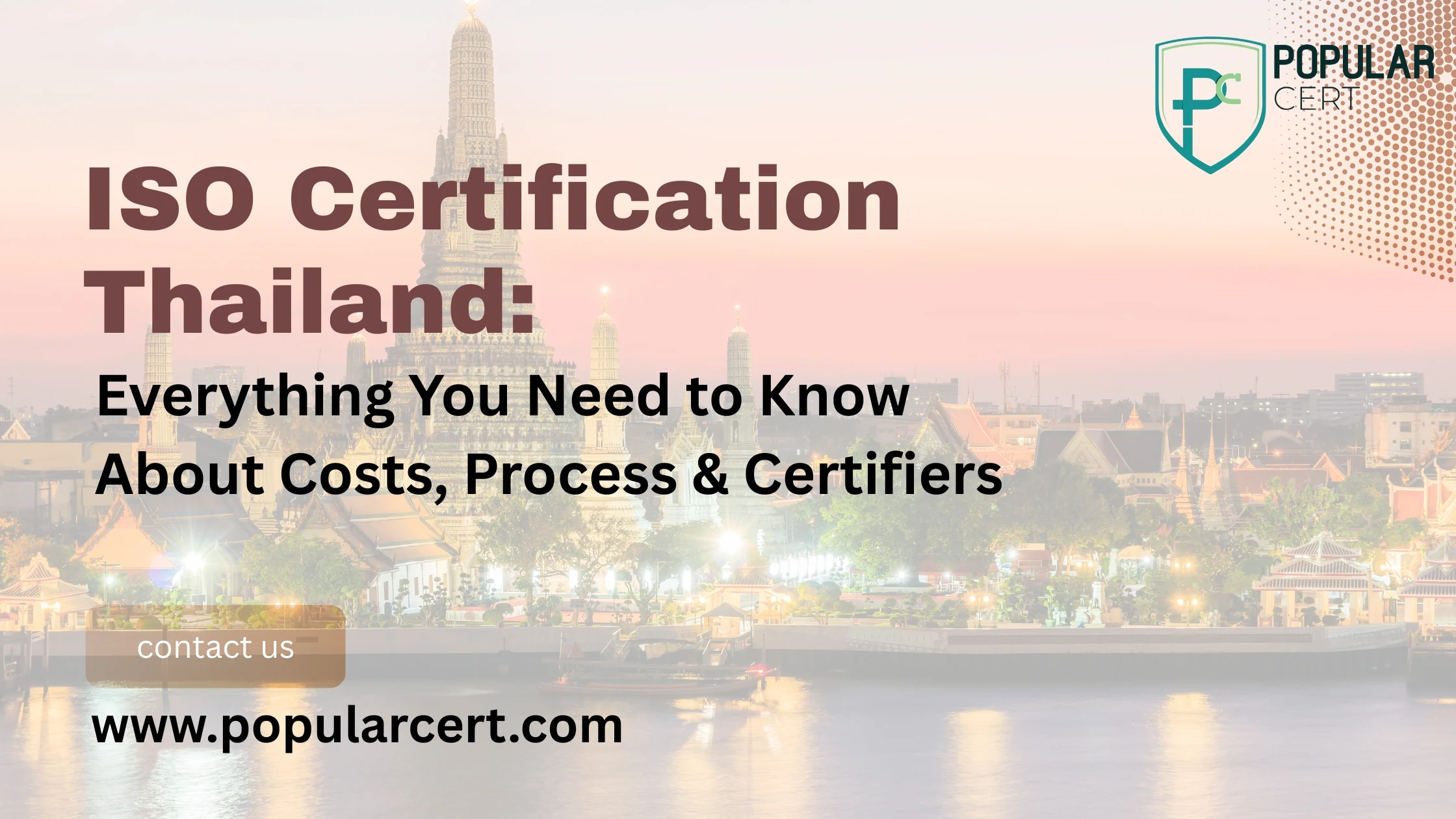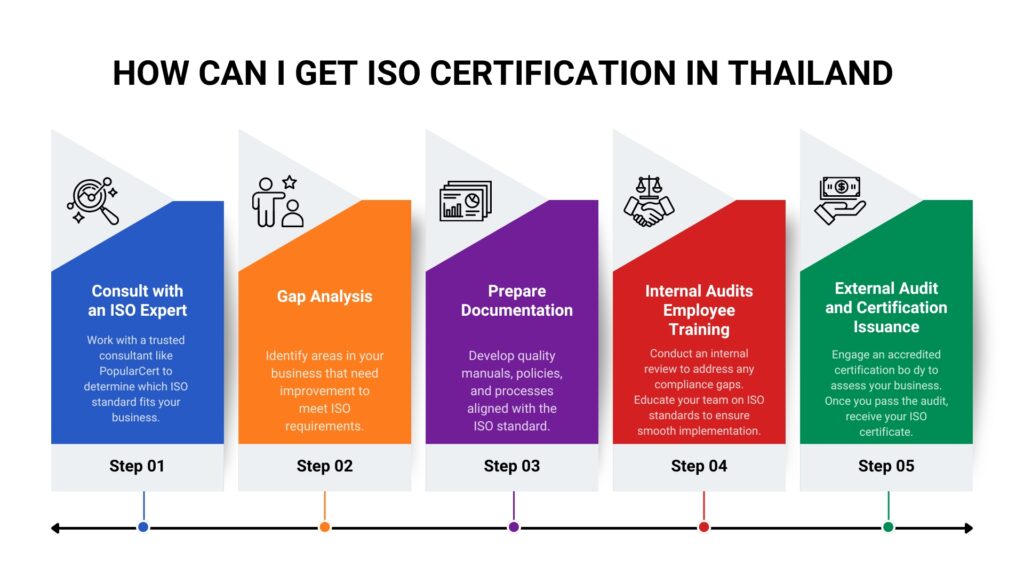ISO Certification Thailand: Everything You Need to Know About Costs Process Certifiers

ISO certification is essential for businesses looking to enhance quality, compliance, and operational efficiency. In Thailand, obtaining ISO certification is increasingly important, not only to improve internal processes but also to build trust with customers, partners, and stakeholders. Whether you’re running a hotel, a manufacturing unit, or an IT company, ISO certification Thailand can significantly boost your business credibility and global competitiveness.
In this comprehensive guide, we’ll walk you through everything you need to know about ISO certification, including the benefits, process, and the importance of choosing the right ISO certification consultants. We’ll also cover specific ISO standards for Thai businesses and how PopularCert, one of Thailand’s top ISO certification bodies, can help you through the process.
What Does ISO Certification Mean in Thailand
ISO certification is a globally recognized standard that ensures products, services, and systems meet high-quality standards. In Thailand, ISO certification enhances operational efficiency, fosters compliance with international standards, and builds credibility, boosting customer confidence.
ISO certification represents a commitment to quality. By becoming ISO certified, businesses in Thailand demonstrate their ability to consistently provide products and services that meet customer and regulatory requirements.
Whether you operate in tourism, manufacturing, or IT, Food processing ISO certification sets your business apart by proving to clients, customers, and partners that your business adheres to global standards. Businesses that are ISO certified are seen as trustworthy, reliable, and committed to continuous improvement.
Which ISO Standards Should My Thai Business Choose?
Choosing the right ISO standard depends on your industry and goals. For quality management, ISO 9001 is key; for environmental responsibility, choose ISO 14001 for information security, ISO 27001 is essential. Align your certifications with specific sector needs to maximize compliance, efficiency, and market access.
- ISO 9001(Quality Management): Ideal for improving operational efficiency, particularly in manufacturing, and services.
- ISO 14001 (Environmental Management): For businesses in tourism, agriculture, and manufacturing, ISO 14001 helps reduce environmental impact and adopt sustainable practices that align with Thailand's BCG (Bio-Circular-Green) economy.
- ISO 27001 (Information Security): Ideal for IT businesses or any company handling sensitive data, ISO 27001 protects data, reduces risks, and ensures compliance with Thailand’s PDPA laws.
- ISO 45001 (Occupational Health and Safety): If you run a construction business or manage large-scale manufacturing operations, ISO 45001 helps ensure the safety and health of your employees.
- ISO 22000 (Food Safety): Essential for businesses in the food and beverage industry, this standard ensures food safety and compliance with international food quality regulations
Types Of Certification
- ISO Certification
- ISO 9001 Certification
- ISO 14001 Certification
- ISO 45001 Certification
- ISO 22000 Certification
- ISO 27001 Certification
- ISO 17025 Certification
- ISO 13485 Certification
- ISO 20000-1 Certification
- ISO 22301 Certification
- ISO 50001 Certification
- ISO 37001 Certification
- IATF 16949 Certification
- ISO 29001 Certification
- ISO 31000 Certification
- ISO 20121 Certification
- ISO 10002 Certification
- ISO 41001 Certification
Get Free Consultation
Our Clients


















Which Industries in Thailand Can Benefit from ISO Certification?
ISO certification applies to nearly every industry in Thailand, including manufacturing, healthcare, IT, and tourism. Whether you’re in medical devices or food production, ISO standards like ISO 13485 (medical devices) or ISO 22000 (food safety) ensure compliance, enhance competitiveness, and foster growth.
- Manufacturing: ISO 9001 for quality management and ISO 50001 for energy efficiency are perfect for manufacturers aiming to improve product quality, reduce energy costs, and boost competitiveness.
- Tourism & Hospitality: ISO 9001 helps ensure service consistency and customer satisfaction, while ISO 14001 promotes eco-tourism practices.
- Healthcare: Medical device manufacturers must comply with ISO 13485 for quality management in production. Additionally, ISO 45001 ensures workplace safety for healthcare workers.
- IT & Cybersecurity: ISO 27001 is crucial for IT businesses that need to safeguard sensitive data and comply with information security regulations.
- Food & Beverage: ISO 22000 ensures businesses meet global food safety standards and gain access to international markets
How Does ISO Certification Impact Thailand’s Tourism Industry?
ISO standards like ISO 9001 (service quality) and ISO 14001 (eco-tourism) transform Thailand’s tourism sector, driving higher guest satisfaction, improving eco-friendly practices, and enhancing global appeal.
For Thailand’s tourism sector, ISO certification plays a vital role in ensuring service quality, sustainability, and safety. Certified tourism businesses report higher guest satisfaction and an increase in international bookings. Benefits include:
- Service Excellence: ISO 9001 streamlines operations, reducing guest complaints.
- Eco-Tourism: ISO 14001-certified resorts protect Thailand’s natural resources and reduce waste.
- Safety: ISO 45001 ensures staff are well-trained and workplace accidents are minimized.
- Global Appeal: ISO-certified businesses attract more partnerships with international travel platforms.
KEY TO DEVELOPMENT FOR TOURISM INDUSTRIES in Thailand
| Key Aspect | Description |
|---|---|
| Quality Services | ISO 9001 ensures consistent service delivery, improving customer satisfaction and repeat business. |
| Sustainability | ISO 14001 helps resorts and tour operators adopt sustainable practices, benefiting both the environment and their reputation. |
| Global Competitiveness | Certified businesses enhance their appeal to international travelers and align with global trends toward eco-conscious tourism. |
| Increased Bookings | ISO-certified tourism operators experience better online reviews and increased visibility on international booking platforms, driving revenue growth. |
Ensuring a Genuine ISO Certificate in Thailand
Not all ISO certification providers deliver authentic certification. Ensure your business receives a legitimate ISO certificate in Thailand by following these steps and working with trusted experts like PopularCert.
Unfortunately, not all ISO certification providers are reliable. To ensure your business obtains a genuine ISO certificate in Thailand, follow these steps:
- Verify Accreditation: Make sure that the certification body is accredited by a globally recognized organization like IAS or UKAS.
- Consult Reputed Providers: Always consult top ISO certification consultants in Thailand, such as PopularCert, who have a strong track record of providing reliable and accredited certification services.
- Cross-Check with ISO’s Official Database: ISO maintains an official database to validate the authenticity of certificates. Cross-check the certification body’s claims before finalizing any agreement.
- Check Customer Reviews and Case Studies: Learn from customer feedback and case studies of businesses that have previously worked with the certification provider to ensure they offer quality services.

Success Stories from Thailand
ISO-certified companies in Thailand have experienced immense growth and success. Local businesses in manufacturing, tourism, and IT have leveraged ISO standards to improve their operations and gain a competitive edge in the market.
Here are a few success stories from Thailand:
- Manufacturing: A Thai car parts supplier obtained ISO 9001 and saw a 30% increase in product quality and reduced defect rates. This helped them secure contracts with major international auto manufacturers, expanding their global footprint.
- Tourism: A luxury resort in Krabi implemented ISO 14001 to improve its eco-tourism practices. As a result, the resort received numerous awards for sustainability, leading to a rise in eco-conscious travelers choosing their services.
- IT: A software development company in Bangkok obtained ISO 27001 for information security, which significantly boosted their reputation. They secured several high-profile clients in industries requiring top-notch data security.
How Often Must You Renew ISO Certification?
ISO certification isn’t a one-and-done process. It requires regular maintenance and renewal to uphold quality. Typically, certifications are valid for three years, with annual surveillance audits to ensure the system’s ongoing effectiveness.
ISO certification is not a one-time event it requires continuous monitoring and renewal. Here’s what you need to know:
- Three-Year Validity: ISO certification typically lasts for three years.
- Annual Surveillance Audits: Businesses must undergo annual audits to maintain compliance and demonstrate that their systems are still effective.
- Renewal Process: At the end of the three years, a full audit will be conducted to determine if the business still meets the necessary standards for renewal.
Stay compliant by partnering with a top ISO certification body in Thailand, like PopularCert, that offers ongoing support and ensures you can easily maintain and renew your certification.
ISO 9001 Quality Manual
How Does ISO Certification Benefit Thai Businesses in the Long Run?
ISO certification is much more than a plaque on your wall. It is a commitment to improvement driven by best practices from around the world. Over time, benefits will increase, making your business a preferred choice for competitors.
ISO certification is more than just an achievement; it’s an ongoing commitment to improving your business practices. The long-term value includes:
- Continuous Improvement: ISO certification ensures that your business adopts international best practices and is always striving for better quality and efficiency.
- Competitive Advantage: Over time, ISO certification amplifies your credibility, making your business a preferred choice for customers, partners, and investors.
- Long-Term Growth: ISO-certified businesses experience consistent growth and enhanced market access, leading to a stronger position in the global market.
Whether you’re pursuing ISO certification or lead auditor training in Bangkok, working with trusted ISO consultants like PopularCert ensures you take the first step toward operational excellence.
How Much Does ISO Certification Cost in Thailand?
The ISO certification cost in Thailand varies depending on factors such as business size, scope, and certification type. While there is no fixed pricing, here are the key cost components to consider:
- Application Fees: Covering initial assessments and document reviews.
- Auditing Costs: Based on company size, number of sites, and the complexity of operations.
- Training and Consultancy Fees: For ISO lead auditor training in Bangkok or hiring ISO consultants to guide certification.
- Post-Certification Maintenance: Annual surveillance audits and renewals.
For accurate pricing, contact the top ISO certification body in Thailand.
Is ISO Certification Available for Foreign-Owned Businesses in Thailand?
Yes, foreign businesses can also get ISO certified in Thailand through local consultants. The process mirrors Thai businesses, but language support and regulatory alignment may be necessary.
Foreign businesses operating in Thailand can obtain ISO certification just like Thai companies. However, there are a few additional steps to consider, such as:
- Consult with Local Experts: Work with bilingual consultants like Popularcert to navigate documentation and language barriers.
- Align with Thai Regulations: Ensure that your certifications meet Thai export requirements by aligning with TISI (Thailand Industrial Standards Institute).
Leverage Benefits: Certification can help with customs clearance, government tenders, and eligibility for BOI tax incentives.
Why PopularCert is a Leading ISO Provider in Thailand
PopularCert sets itself apart as a top certification provider with fast processing times, transparent costs, and verified accreditation. Their expertise can help businesses achieve fast ISO certification in Thailand, making them the preferred choice for companies across industries.
Ready for ISO? Connect with PopularCert
Unlock your business’s potential with expert guidance. Get a free consultation to explore your certification path. Secure your future today, contact now.
GET A FREE CONSULTATION NOW
FAQ
Why is ISO certification important for my business
ISO certification improves your business’s credibility, operational efficiency, and customer trust. It’s invaluable for gaining a competitive edge in local and global markets.
Can small businesses get ISO certification?
Yes, small businesses can definitely benefit from ISO certification. It provides them with a competitive edge and supports long-term growth.
How much does ISO certification cost?
The cost depends on the size, scope, and complexity of your business. Get a quote from a reliable consultant in Francistown to estimate costs accurately.
By understanding the ISO certification process and leveraging expert assistance, businesses in Francistown can unlock their full potential and thrive in a competitive global market.
Is ISO Certification Mandatory in Thailand?
ISO certification is generally voluntary in Thailand. However, certain industries, such as food production and healthcare, may require ISO certification to comply with legal or export regulations. Several tourism-related businesses also pursue ISO certification for hotels in Thailand to meet international visitor expectations.
Is ISO certification permanent?
No, ISO certifications are valid for three years, with annual audits required to maintain certification.
